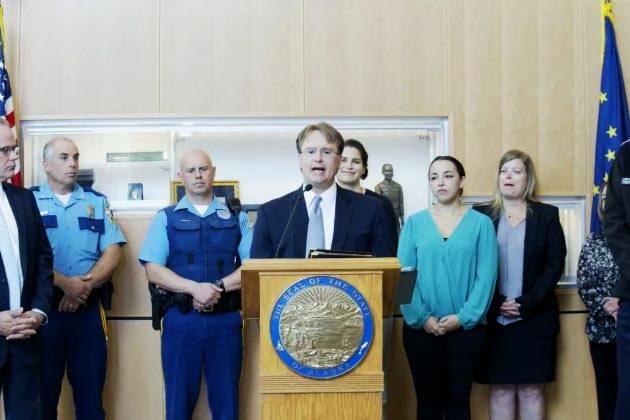Leaders of major law enforcement agencies across Alaska, Department of Law officials and Gov. Mike Dunleavy announced a major criminal justice initiative Tuesday.
The initiative will expand DNA collection and processing for violent and sexual felonies, focusing on collecting owed DNA from more than 20,000 people, said deputy attorney general John Skidmore.
“Alaska has one of the highest sexual assault rates in the country,” Dunleavy said. “It’s not something any of us are proud of. Over the years, there have been a number of initiatives to try and work on this.”
Alaska currently has DNA for roughly 75% of people whose DNA the state is required to collect by law Dunleavy said.
[Juneau man sentenced for multiple sexual assaults]
“The administration is prioritizing who we will go after first. The areas that we’re going to start with are those that were convicted of a felony crime against a person. We talked about this large number, that was 20,000,” Skidmore said. “There are less than 600 that are felony crimes against a person where there’s DNA owed and that’s where we’re going to start our efforts, and then we’re going to expand from there as we set priorities about who we think are the most significant people that we have the collection from.”
By prioritizing collecting DNA from those of interest in felony crimes, the government hopes to be able to bring closure to crimes- and to victims- as rapidly as possible, Skidmore, pointing to a cold case sexual assault in Kenai that was solved in 2020 with the aid of DNA evidence.
“Oftentimes, an individual that is involved in a sexual assault, it’s not the first time, it’s not the last time,” Dunleavy said. “We want it to be the last time. We don’t want it to happen at all but we certainly want it to be the last time.”
A separate statute from the mandate to collect DNA in felony cases will make refusal to submit DNA for a conviction requiring it a Class C felony, Skidmore said.
“We want to get the kits processed timely. We want to get back to victims timely. And we want to collect this other DNA to help us solve those crimes,” Skidmore said. “We know that collecting this DNA in combination with processing the [sexual assault] kits faster will aid us.”
A number of personnel in relevant organizations, including the Department of Public Safety, Department of Corrections, Anchorage Police Department and victim’s advocacy organizations among others spoke as well.
“We will be working with local and state law enforcement agencies to locate these individuals and collect their DNA,” said Department of Public Safety Commissioner Jim Cockrell during the news conference. “Our number one priority will be violent offenders and sex offenders.”
DOC will focus on collecting from three different groups of people falling under the convictions requiring a DNA sample, Dahlstrom said: those currently incarcerated, those out on probation or parole for a related conviction and those being booked for a charge that requires a DNA sample.
“Over the years, DOC has collected tens of thousands of DNA samples,” Dahlstrom said. “We’re going to collect DNA and make sure the samples get to the crime lab for analysis.”
The move is one of a series of high-profile efforts to stem Alaska’s rates of sexual assault, which occurs at a reported rate as high as four times the national average in recent years, the highest in the country.
“We’re going to be looking at our laws. We’re going to be looking at sex trafficking. We’re going to be looking at abuse of children. This is a huge undertaking,” Dunleavy said. “This is just one step of a series of steps that we’ve taken and we’ll continue to take. This goal is for Alaska to no longer be known as one of the top states for sexual assault.”
State lawmakers at the news conference echoed the sentiment.
“I have a vision that I will wake up one day in Alaska when we don’t lead the nation in rates of domestic violence. and sexual assault,” said Alaska state Rep. Geran Tarr, D-Anchorage, during the news conference. “I think this is a step that’s going to get us there.”
• Contact reporter Michael S. Lockett at 757-621-1197 or mlockett@juneauempire.com.

